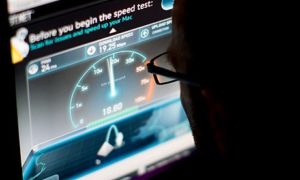“Blazing fast!” “Lightning speed!” Such promises are routinely declared by various providers of broadband service. But what speed really is considered to be fast? And, would you even know it if you had fast broadband service…or didn’t have it?
 As it happens, about 80% of Americans don’t know what speed they’re getting from their broadband service. To some, their humble 512 Kbps upload speed is “fast” because the service provider says it is. Users see ads promising the moon, pay monthly fees that would buy a universe, and may end up only getting the equivalent of a junior telescope.
As it happens, about 80% of Americans don’t know what speed they’re getting from their broadband service. To some, their humble 512 Kbps upload speed is “fast” because the service provider says it is. Users see ads promising the moon, pay monthly fees that would buy a universe, and may end up only getting the equivalent of a junior telescope.
It doesn’t help that there’s often confusion over the letters “mbps.” These letters stand for the rate of speed data is transferred per second (that’s the “ps” part). MBps (with the B capitalized) indicates megabytes per second; Mbps (with the b in lower case) indicates megabits per second. Bits are much smaller than bytes; there are eight bits to a byte, and eight Megabits per second would be the same as just one Megabyte per second. But because the same series of letters is used for both measurements, consumers can mistakenly think they’re getting a speed notated in megabytes when it’s actually megabits.
[Read also: The Future of Broadband]
Does Broadband Speed Matter?
Well, it might, and then again, it might not. It depends on when and what you use your broadband connection for.

Your broadband speed tends to be slower during peak hours
The timing issue is due to the necessity of sharing space when the broadband connection gets overloaded. It’s like hitting a rush hour traffic jam: bottlenecks slow everyone down. For example, if the broadband connection in your area serves many people who all come home from work at 6:00pm and start cruising through YouTube videos, then you’ll likely find your speed plummeting at that time of day. If you can avoid using your broadband connection during peak hours, then a (truly) high speed broadband service may not be necessary for you.
Another factor impacting the level of speed you’ll want for your broadband connection is what you use your connection for. Sending and receiving emails and other text-based data takes very little to transmit, but add photos, videos and the biggie, gaming, into the mix, and suddenly that 1 Mbps that your company touted as “super fast” turns into “super dud.”
[Recommended read: Broadband 2000x Faster – and for the same price!]
How to Determine What Speed You Need
There’s a good chance you’re paying for speed you’re not even using. Check whether your broadband contract allows you to upgrade or downgrade to check out various speeds. If you’re not a heavy user, try ratcheting it down for a month to save money. If, however, you find yourself regularly muttering, “Come on; come onnnnn” at your connection, then you might be a good candidate for a speed upgrade.
[Read also: How to Improve a Slow Internet Connection]
In any event, contact your broadband provider to confirm what speed they’re claiming to provide you (pay attention whether it’s noted as MBps or Mbps). Ask about both upload and download speeds, as these are two different things. Then, check your own speed by using one of the many free broadband speed test sites available online. Test during a weekday and over a weekend, running the test several times each day. You’ll likely see varying results depending on the day of the week and the time of day, but you should come up with an aggregate average. Compare your findings with the company’s claims, and discuss any large discrepancies with your broadband provider.
Don’t pay more than necessary for your broadband service. Do your homework, make sure you’re getting the speed promised by your provider, and only buy as much speed as you need, downgrading if it makes sense. Any money you save on cheaper broadband service can go toward getting a new (faster) processor for your computer!
[Read also: Comparing Aspects of Mobile Broadband and Fixed Line (ADSL)]

Good article Sam, it is interesting to know what speeds you get.
That said if you are promised up to 20mb/s download and you get 8mb/s most of the time, what can you do about it? You probably can’t get cross at your provider, as 8 is still reasonable, but not the 20 you want… Were you offered up to 20mb/s but got 0.5mb/s you might have a case, and could get a better deal, so it is worth checking your speed, but don’t obsess about it.
Great article Peter. I agree that most people way overshoot how much speed they need. When someone asks me about speed, I ask what they are using it for. If they are streaming video, then yes, the speed is probably worth it. However, for web browsing and email checking, a monster connection is not needed.
I used to have a 100mb broadband cable but it was a waste of money because when I moved to my new apartment I could only get 30mb and I can’t see any difference when I download files or browse the net compare to my old connection. So it’s true that you don’t need a mega broadband connection to download files, browse the net or watch movies online.
We used to have Verizon and it was always very close to what they said it would be. Didn’t matter if it was day or night. Off peak or on peak it was almost always very good. Well they sold out to another company a couple of years back and the new company must have cut the pipe. I am lucky to get half the speed during peak hours at best. I couldn’t even count how many times the service cuts out since they took over. Watching large videos during peak hours doesn’t usually work so well anymore.
On another note my sister lives a few miles out of town and she can’t get cable, dsl, or wireless (tower). Her only option is satellite internet, which is spendy like seventy to one hundred dollars per month and slow. I also have an uncle that lives in a small town. He can only get 768k at something like forty to fifty dollars per month. It can really depend on where you live.
I could never get this ‘science’ about how to determine the internet speed that’s sufficient for me. Thanks for sharing the helpful information.
HI Peter,
Nice Informative post about how one can check what broadband speed he/she is getting.Thank you so much for this information.
Regards,
Joel